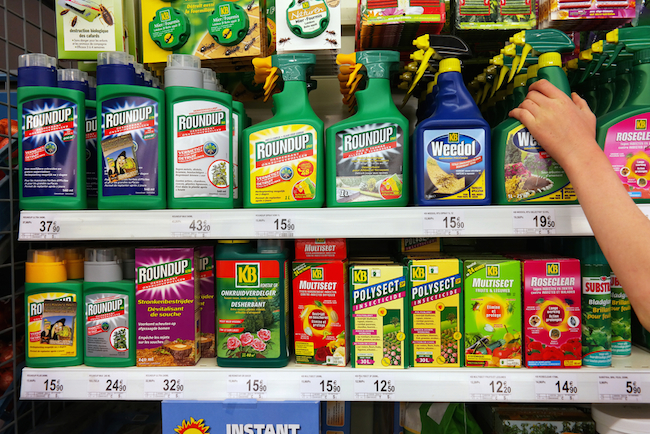Cultures
Monsanto’s Hired Troll Army and What They’re Trying to Hide

Image: Shutterstock/defotoberg
Have you recently seen attacks online defending the safety of Monsanto’s well-known herbicide, RoundUp, or its main ingredient, glyphosate? If so, then you may have experienced the work of Monsanto’s army of hired internet trolls. But why would the chemical giant stoop to such levels if their products are actually as safe as we’ve been told? Accusations point to lawsuits unveiled in March which raise an eyebrow on how safe it really is.
Large corporations and other such entities are commonly accused of hiring internet trolls to spread disinformation and safeguard their reputations online (Think: the United States 2016 Presidential Election). However, very few, if any, of these accusations are ever substantiated with verifiable fact. This time, things are different. Upping suspicion in Monsanto’s direction, U.S. District Judge Vince Chhabria of San Francisco ordered documents unsealed in March pertaining to lawsuits alleging that RoundUp caused Non-Hodgkins’ Lymphoma and Monsanto knowingly covered up the safety risks.
Once reviewed, the documents proved that Monsanto staff was given permission by executives to ghostwrite glyphosate “research”, and later seek out academics willing to sign it. They also prove collusion between the corporation and U.S. federal regulatory staff. Says the New York Times, “The court documents included Monsanto’s internal emails and email traffic between the company and federal regulators. The records suggested that Monsanto had ghostwritten research that was later attributed to academics and indicated that a senior official at the Environmental Protection Agency had worked to quash a review of Roundup’s main ingredient, glyphosate, that was to have been conducted by the United States Department of Health and Human Services.”
Conflicting directly with previous research announcing glyphosate’s safety, the series of lawsuits claim that the U. S. Environmental Protection Agency’s deputy division director Jess Rowland warned Monsanto staff about the negative findings prior to the World Health Organization’s research results being released two years ago. The World Health Organization’s (WHO) branch of IARC, or the International Agency for Research on Cancer, subsequently released the findings which cited glyphosate as a probable carcinogen and included research which linked glyphosate to Non-Hodgkins’ Lymphoma. Way ahead of them, sadly, due to Rowland’s collusive warning, was a well-prepared public relations campaign to discredit the research, including the unleashing of Monsanto’s hired trolls across the internet. Labelled the “Let Nothing Go” program, the trolls, hired through third parties, were assigned to do just that — let nothing go online including Facebook and other social media comments, and were to vehemently defend the safety of Monsanto’s products, anything GMO-related, as well as RoundUp specifically. Documents also show this is not the first time Monsanto has resorted to such tactics either, confirming similar practices following the release of information in 2000.
According to the lawsuits, four individuals who developed Non-Hodgkins’ Lymphoma believe their cancer risk increased from prolonged exposure to the herbicide over several years. The lawsuit also states that Monsanto “concealed or systematically sought to discredit” the research-backed dangers of RoundUp. The plaintiffs’ law firm’s website asserts that those particularly at risk of RoundUp hazards are people who work most closely with the product, including farm workers, nursery employees, garden center workers, and landscapers.
In response to a story RT ran on the issue, Monsanto insisted their products do not cause cancer, stating, “…no regulatory agency in the world considers glyphosate a carcinogen,” (by this remark, Monsanto referred to regulatory authorities in Europe, US, Canada, Japan, New Zealand and Australia, who “have publicly reaffirmed that glyphosate does not cause cancer”), and, “Plaintiffs’ attorneys in the United States have been soliciting plaintiffs for potential lawsuits since an ad hoc working group called IARC incorrectly classified glyphosate…These attorneys are attempting to tie the IARC classification to individual cases of cancer, and they have been running advertisements to recruit plaintiffs. These lawsuits have no merit.”
In any case, there’s no mystery as to why Monsanto would want to discredit any links to health risks by its chemicals. The year 2015 saw the company at $4.76 billion in herbicide sales, and is currently on target for $10 billion worldwide on glyphosate sales alone within the next five years. So don’t be surprised if you notice people attacking the opposition online. In response to the troll issue, the lawsuits’ main attorney Mike Papantonio advises, “Next time you’re scrolling through social media, YouTube or even this website’s comment section, remember that the trolls attacking you for no apparent reason may in fact be receiving an annual salary.”





0 comments